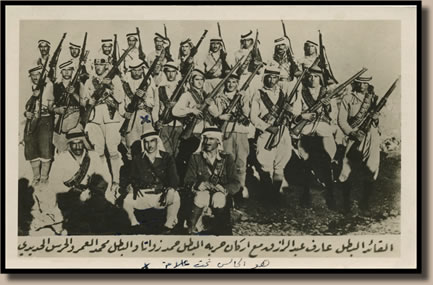ELTAHER AND ARAB REALITIES
Throughout his life, Eltaher was a true and faithful Arab nationalist. Islam for him was the civilizational and cultural framework through which the Arab nation, with its various ethnic and religious components, lived and worked, but he was not a practicing person with respect to religion. Whether people were Arabs, Kurds, Berbers, Indians, Indonesians, Afghans, Christians or Muslims of all shades and beliefs had no bearing or influence on his relationship with them. His son was sent to the Catholic Christian Brothers schools in Cairo, and his daughter also went to Catholic nuns schools in Cairo and Beirut. Eltaher mentioned in his book “Moataqal Huckstep” that Egyptian political detainees of the Jewish faith incarcerated during the 1948 Palestine war, recognized him when they saw him at the internment camp and wished him well on Eid day. All to illustrate his tendency to stand by all those who were unjustly treated in their struggle against injustice and oppression. This is all reflected in the articles he wrote, the books he published and his personal relationships, which transcended all geographic, religious and ideological boundaries.
Because of his political and nationalist principles, and fierce stand against colonial powers, the latter obviously took an unfriendly stand towards him and frequently complained to the Egyptian government about his support to Arab and Islamic peoples under their colonial hegemony. On one such occasion, the Italian ambassador to Egypt complained directly to Mohamed Mahmoud Pasha, the Prime Minister of Egypt. The ambassador asked the Prime Minister to silence Eltaher, who, according to the ambassador, was “a foreigner misusing his welcome in Egypt by provoking the people of Libya against the Italian colonial authorities”, and that “Egypt, as friend of Italy, should not allow him to affect its relations with the government of the Duce, Benito Mussolini”. Mahmoud Pasha responded that in his view, as an Arab resident in Egypt, Eltaher was like other Egyptians, and added that while he had never met Eltaher previously, but certainly heard of him, he could appreciate his point of view regarding colonialism, and that he agreed with Mohamed Ali Eltaher that Italy mistreated the Libyans.
Eltaher’s writings also covered issues and details about the reasons for the loss of Palestine that were due to the gross incompetence of the Arab governments, and in one case at least criminal collusion with the enemy. Some Jewish and Israeli historians have either not considered or intentionally ignored in their works the degree of these shortcomings, possibly in order to assign all the credit to the prowess of their own fighters. Until today for example, the inexcusable behaviour of King Abdallah I of Jordan during the years of struggle, when he colluded with the Jews against the Palestinians is often described by a few Jordanian and Israeli historiographers as those of a man of astuteness and vision.
In an interview with the Egyptian weekly news magazine “Rose El-Youssef” on May 15, 1936 about the Great Palestine Revolt that was raging at that time, Mohamed Ali Eltaher said that “Palestine was in revolt for the sixth time within fifteen years because the British were actively pushing the Palestinians out of their country in order to settle the Jews in their place”.. He pointed out that “the 1936 Revolt was against British colonial rule, and was triggered by national pride, the need for self defence, ensure their existence and love for one’s homeland”.. Eltaher further recalled that “the British came to Palestine as an ally of the Arab nation, but ruled over them as a colonized people, but the British were seeking a new road to India at our expense by creating a base that does not cost them anything. They thus brought the Zionists from all over the world, staked our lands to them until they constituted one third of the population, and soon they will become the majority.”
He further added that “at the beginning, the people of Palestine were wrong when they fought the Jews as being the source of their affliction, which is what happened during the previous revolts in Palestine in 1920, 1921 and 1929. However, they finally came to realise that the origin of the real calamity is British colonialism. From then on they directed their revolt against the British themselves as in 1930 and 1933”.
During the interview Mohamed Ali Eltaher pointed out to the “Rose El-Youssef” reporter that the British “did their best to hide the real causes of the revolt by alleging that it was nothing more than disturbances between Arabs and Jews. That is the British were angels who did nothing but maintain peace and order and prevent either side from attacking the other. The reality is that it was British soldiers who attacked the population and hunted both Muslims and Christians by firing at them, even when nobody confronted their troops”.
Eltaher also often dwelt on the short-sightedness, or stubborness certain Palestinian leaders displayed. He did not even spare his long-standing friend and most senior Palestinian leader, the Mufti of Palestine Haj Amin Al-Husseini, from his criticism. All these factors combined allowed the Jews to take over the country and snatch it from its people with relative ease. They acquired a country with furnished houses, with closets full of clothes and toys, with schools, cars, planted fields, blossoming fruit orchards, and crops that the Palestinian farmers were not able to harvest, running underground and surface water, complete with ports, airports, beaches and even the air it breathes.
|
Palestinian resistance commander Aref Abderrazeq (x)
and members of his military staff
Hamad Zawata, Mohamed Al-Amr
and the Iron Guard
during the 1936-1939 Great Revolt in Palestine |

